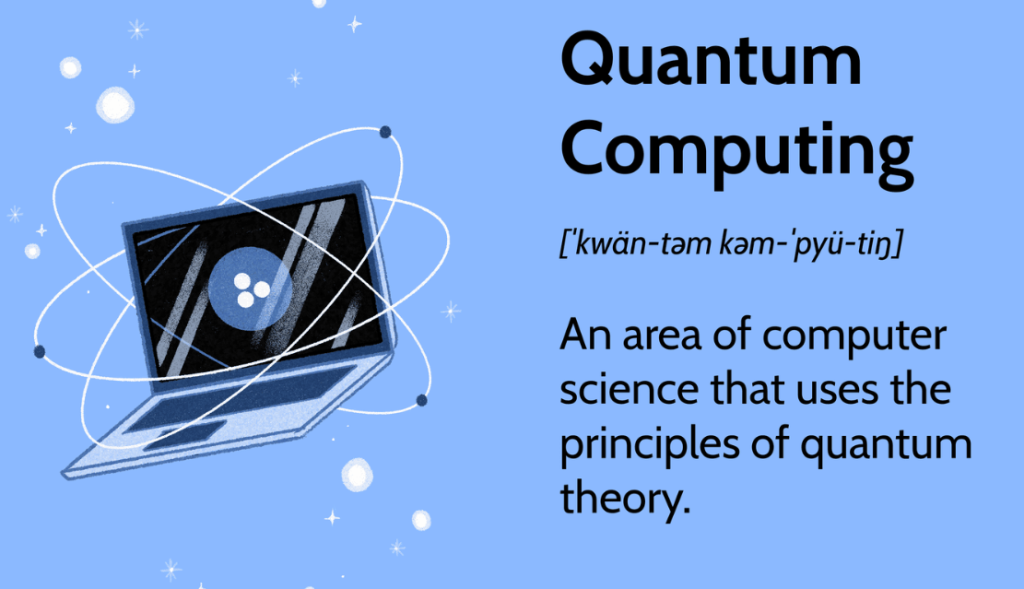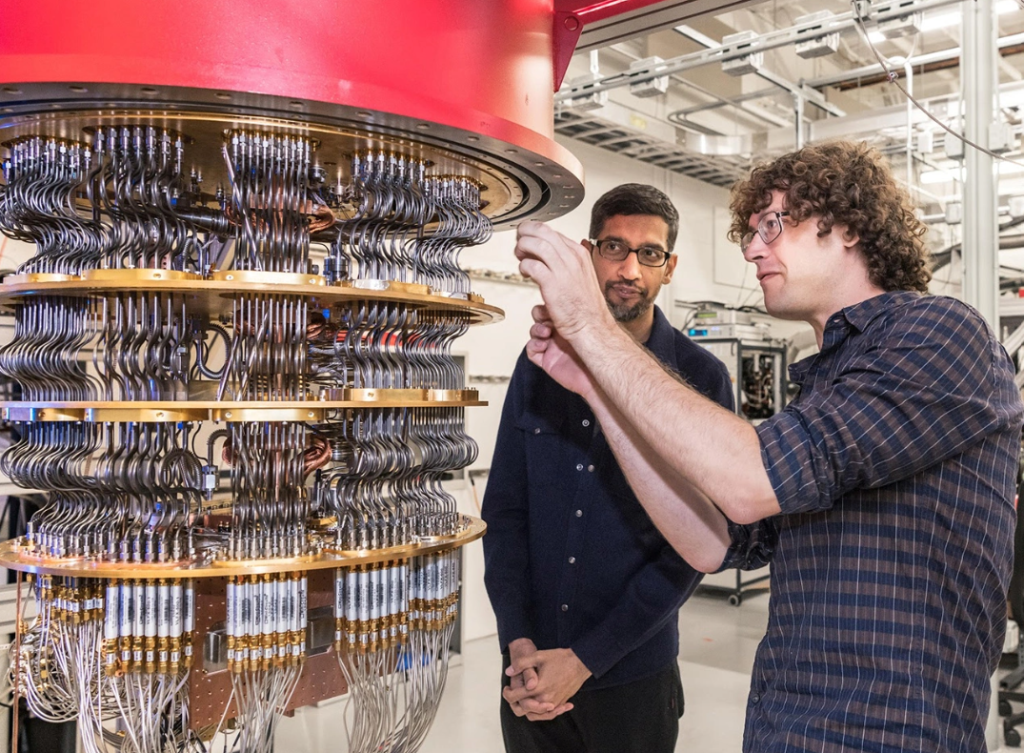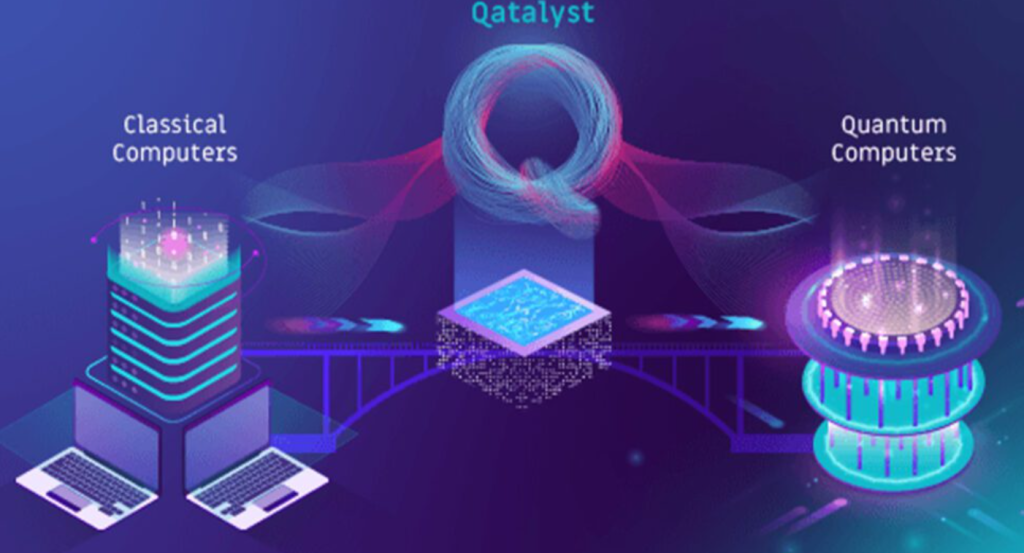
Quantum computing is a cutting-edge field of computing that leverages the principles of quantum mechanics to perform certain types of calculations much more efficiently than classical computers. Unlike classical computers, which use bits as the fundamental unit of information (0s and 1s), quantum computers use quantum bits or qubits. Qubits can represent both 0 and 1 simultaneously, thanks to a property known as superposition.
What is quantum computing in simple terms?
Quantum computing is a new type of computing that harnesses the power of quantum mechanics to solve problems that are too complex for classical computers.
Classical computers use bits, which can be either 0 or 1. Quantum computers use qubits, which can be 0, 1, or both at the same time. This is called superposition.
Another important quantum effect is entanglement. This is when two qubits are linked together in such a way that they share the same fate, even if they are separated by a large distance.
By exploiting superposition and entanglement, quantum computers can perform certain calculations exponentially faster than classical computers.
For example, a quantum computer could factor a large number into its prime factors much faster than a classical computer. This would have implications for cryptography, as many encryption algorithms rely on the difficulty of factoring large numbers.
Quantum computers could also be used to simulate complex molecules and materials. This could lead to new discoveries in chemistry and materials science.
Quantum computing is still in its early stages of development, but it has the potential to revolutionize many fields.
Here is a simple analogy to help you understand quantum computing:
Imagine you have a coin. You can flip the coin and it will land on either heads or tails. This is like a classical bit, which can be either 0 or 1.
Now imagine you have a quantum coin. When you flip it, it can land on heads, tails, or both heads and tails at the same time. This is like a qubit, which can be 0, 1, or both at the same time.
If you have two quantum coins, you can entangle them so that they share the same fate. This means that if you flip one coin and it lands on heads, the other coin will also land on heads, even if it is miles away.
Quantum computers can use superposition and entanglement to perform calculations that are impossible for classical computers. For example, a quantum computer could search through a database of all possible solutions to a problem simultaneously, instead of having to search through each solution one by one.

What is Qubits?
Qubits, short for “quantum bits,” are the fundamental units of information in quantum computing and quantum information theory. They are the quantum analogs of classical bits (0s and 1s) used in classical computing. The key difference between classical bits and qubits is that qubits can exist in a superposition of states, allowing them to represent both 0 and 1 simultaneously.
A qubit, or quantum bit, is the basic unit of information in quantum computing. It is the quantum equivalent of a bit, which is the basic unit of information in classical computing.
A bit can be either 0 or 1, while a qubit can be 0, 1, or both at the same time. This is because qubits exploit the principles of quantum mechanics, such as superposition and entanglement.
Superposition allows a qubit to be in multiple states at the same time. For example, a qubit could be in a superposition of the states 0 and 1. This means that it is both 0 and 1 at the same time.
Entanglement allows two or more qubits to be linked together in such a way that they share the same fate, even if they are separated by a large distance. If you measure the state of one entangled qubit, you will instantly know the state of the other qubits.
Superposition and entanglement give quantum computers the ability to perform certain calculations exponentially faster than classical computers. For example, a quantum computer could factor a large number into its prime factors much faster than a classical computer. This would have implications for cryptography, as many encryption algorithms rely on the difficulty of factoring large numbers.

Key Principles and features of Quantum computing
- Superposition: Qubits can exist in a superposition of states, meaning they can represent multiple values at the same time. This property allows quantum computers to process a vast amount of information in parallel, potentially speeding up certain types of calculations.
- Entanglement: Qubits can become entangled, where the state of one qubit is dependent on the state of another, even if they are physically separated by large distances. Entanglement enables quantum computers to perform complex operations that classical computers struggle with.
- Quantum gates: Quantum computers use quantum gates to manipulate qubits. These gates are analogous to classical logic gates (e.g., AND, OR, NOT), but they operate on the principles of quantum mechanics. Quantum gates enable the creation of quantum circuits to perform specific computations.
- Quantum algorithms: Quantum computers have the potential to run quantum algorithms that can solve certain problems much faster than classical algorithms. For example, Shor’s algorithm can factor large numbers exponentially faster than the best-known classical algorithms, which has implications for breaking encryption schemes like RSA.
- Quantum supremacy: Quantum supremacy is the term used to describe the point at which a quantum computer can outperform the most powerful classical supercomputers in a specific task. In 2019, Google claimed to have achieved quantum supremacy by demonstrating a quantum computer capable of performing a specific calculation faster than any classical computer.
How Quantum Computing Works?
Quantum computing works by exploiting the principles of quantum mechanics, such as superposition and entanglement.
Superposition allows a qubit to be in multiple states at the same time. For example, a qubit could be in a superposition of the states 0 and 1. This means that it is both 0 and 1 at the same time.
Entanglement allows two or more qubits to be linked together in such a way that they share the same fate, even if they are separated by a large distance. If you measure the state of one entangled qubit, you will instantly know the state of the other qubits.
Quantum computers use qubits to perform calculations that are impossible for classical computers. For example, a quantum computer could search through a database of all possible solutions to a problem simultaneously, instead of having to search through each solution one by one.
Here is a simplified example of how a quantum computer could be used to solve a problem:
- The problem is encoded into a set of qubits.
- The qubits are manipulated using quantum gates.
- The qubits are measured to obtain the solution to the problem.
Quantum gates are operations that can be performed on qubits. They are analogous to the logical gates that are used in classical computing. However, quantum gates are much more powerful than classical gates, because they can operate on qubits that are in a superposition of states.
Measuring a qubit collapses its superposition into one of its possible states. This is the only way to obtain the solution to a problem that is being solved by a quantum computer.
Quantum computing is still in its early stages of development, but it has the potential to revolutionize many fields, including medicine, materials science, and finance.
Here are some examples of potential applications of quantum computing:
- Drug discovery
- Material design
- Financial modeling
- Cybersecurity
- Artificial intelligence
What is quantum computing with examples in real life
Quantum computing is a rapidly advancing field of technology that has the potential to revolutionize various industries and solve complex problems more efficiently than classical computers. While practical, large-scale quantum computers are still in the early stages of development, there are already several potential real-life applications and examples where quantum computing could have a significant impact:
- Cryptography:
- Example: Breaking RSA encryption Quantum computers have the potential to factor large numbers exponentially faster than classical computers using Shor’s algorithm. This could make widely-used encryption methods like RSA insecure, leading to the need for new quantum-resistant encryption algorithms.
- Drug Discovery:
- Example: Simulating complex molecular interactions Quantum computers can simulate the behavior of molecules and chemical reactions more accurately than classical computers. This capability could revolutionize drug discovery by enabling researchers to design new drugs, understand molecular biology, and study complex biochemical systems in ways that were previously impractical.
- Optimization:
- Example: Supply chain optimization Quantum computers can solve optimization problems, such as finding the most efficient routes in logistics or minimizing costs in financial portfolio management, much faster than classical computers. This can lead to significant improvements in supply chain efficiency and financial decision-making.
- Artificial Intelligence (AI):
- Example: Machine learning and pattern recognition Quantum computing has the potential to enhance machine learning algorithms by enabling the processing of large datasets and complex models more efficiently. Quantum machine learning algorithms can lead to advancements in fields like natural language processing, image recognition, and data analytics.
- Material Science:
- Example: Discovering new materials with desired properties Quantum computers can simulate the behavior of atoms and electrons in materials, helping researchers design new materials with specific characteristics, such as superconductors or advanced catalysts for renewable energy applications.
- Climate Modeling:
- Example: Simulating climate change and its impact Quantum computers can run highly complex climate models more accurately and quickly, allowing scientists to better understand climate change, predict its effects, and develop mitigation strategies.
- Financial Modeling:
- Example: Risk assessment and portfolio optimization Quantum computing can analyze financial data and assess risk in real time, helping financial institutions make more informed investment decisions and manage their portfolios effectively.
- Protein Folding:
- Example: Understanding protein structures Quantum computers can accelerate the process of predicting protein folding, which is crucial in drug discovery and understanding diseases like Alzheimer’s and COVID-19.
Future of Quantum Computing
The future of quantum computing is very promising. Quantum computers have the potential to revolutionize many fields, including medicine, materials science, finance, and artificial intelligence.
In the near future, we can expect to see quantum computers being used to solve problems that are currently intractable for classical computers. For example, quantum computers could be used to develop new drugs, design new materials, and create new financial models.
In the long term, quantum computers could lead to the development of new technologies that we can’t even imagine today. For example, quantum computers could be used to develop new forms of communication and transportation or to create new forms of artificial intelligence that are far more powerful than anything we have today.
Here are some specific examples of what the future of quantum computing might look like:
- Drug discovery: Quantum computers could be used to simulate the behavior of molecules with unprecedented accuracy. This could lead to the development of new drugs that are more effective and have fewer side effects.
- Material science: Quantum computers could be used to design new materials with improved properties, such as strength, lightness, and durability. This could lead to the development of new products, such as stronger airplanes and cars, and more efficient solar cells.
- Financial modeling: Quantum computers could be used to develop more accurate financial models. This could help businesses make better decisions about where to invest their money and how to manage their risk.
- Cybersecurity: Quantum computers could be used to develop new encryption algorithms that are unbreakable by classical computers. This would help to protect our data from hackers and other cyber threats.
- Artificial intelligence: Quantum computers could be used to develop new AI algorithms that are more powerful and efficient than current AI algorithms. This could lead to the development of new AI systems that can solve problems that are currently intractable for AI, such as protein folding and natural language processing.
Difference between Classical computers and Quantum Computers

Classical computers and quantum computers are two different types of computers that use different principles to perform calculations.
Classical computers use bits, which can be either 0 or 1. Quantum computers use qubits, which can be 0, 1, or both at the same time. This is called superposition.
Another important quantum effect is entanglement. This is when two qubits are linked together in such a way that they share the same fate, even if they are separated by a large distance.
By exploiting superposition and entanglement, quantum computers can perform certain calculations exponentially faster than classical computers.
Here is a table that summarizes the key differences between classical computers and quantum computers:
| Feature | Classical computer | Quantum computer |
|---|---|---|
| Bit size | 1 bit | 1 qubit |
| State | Can be 0 or 1 | Can be 0, 1, or both at the same time (superposition) |
| Operations | Can be performed on one bit at a time | Can be performed on multiple qubits at the same time (parallel processing) |
| Speed | Limited by the speed of light | Can be exponentially faster than classical computers for certain tasks |
| Maturity | Commercially available | Still in early stages of development |
Applications
Classical computers are used for a wide variety of tasks, including:
- Web browsing
- Word processing
- Gaming
- Scientific computing
- Business applications
Quantum Computing Success Journey and Timeline
Quantum computing is a rapidly developing field, and there have been many successes in recent years.
One of the most notable successes was the demonstration of quantum supremacy by Google AI in 2019. In this experiment, a quantum computer was able to perform a calculation that would have taken a classical computer millions of years to complete.
Another major success was the development of a quantum algorithm for breaking RSA encryption, one of the most widely used encryption algorithms in the world. This algorithm was developed by researchers at the University of Waterloo in 2022.
In addition to these major breakthroughs, there have been many other successes in quantum computing in recent years. For example, researchers have developed quantum algorithms for solving problems in drug discovery, material science, and financial modeling.
Quantum computing is still in its early stages of development, but these successes show that the technology has the potential to revolutionize many fields.
Here are some specific examples of quantum computing successes:
- In 2021, a team of researchers at IBM used a quantum computer to simulate the behavior of a molecule with unprecedented accuracy. This could lead to the development of new drugs that are more effective and have fewer side effects.
- In 2022, a team of researchers at Google AI used a quantum computer to design a new material that is stronger and lighter than any known material. This material could be used to build new products, such as stronger airplanes and cars.
- In 2023, a team of researchers at JPMorgan Chase used a quantum computer to develop a new financial model that is more accurate than any existing model. This model could help banks to make better decisions about where to invest their money and how to manage their risk.
dsad
This is the best article I have ever read on quantum computing. Thank you! Specifically you described the qubits
I am excited to see what the future holds for quantum computing. I believe that quantum computers have the potential to solve some of the world’s most challenging problems and make the world a better place.
Wonderful!. Quantum physics is a panacea for all our security and trust issues of today’s computing/internet/digital world!!
quantum computing have awesome future makes our task easier and provide flexibility and very fast using new feature qbits at a time we can send both binary variable 0 and 1 that makes our work fast
Thank you for demystifying quantum computing! Your article explained this complex topic in such a clear and concise way. I finally have a better grasp of what it’s all about.